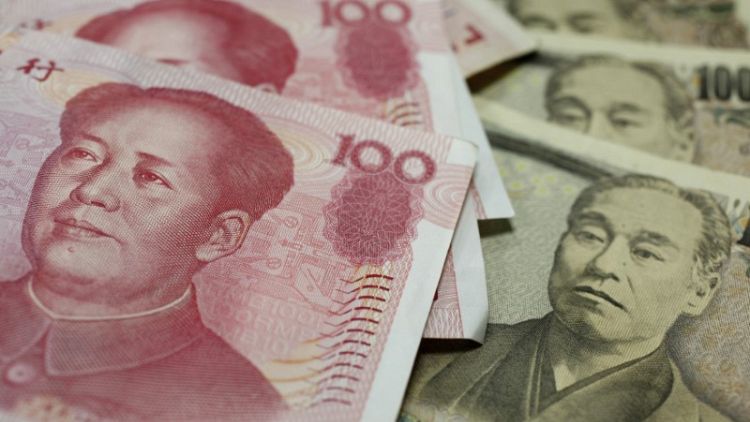By Chandini Monnappa
(Reuters) - Investors trimmed bearish bets on most emerging Asian currencies over the last two weeks, as renewed trade war concerns were cushioned by regional central bank efforts to shore up their currencies, a Reuters poll showed.
Central banks across the globe adopted tightening postures, with the U.S. Federal Reserve keeping its interest rates unchanged last week but likely to remain on track to increase borrowing costs in September.
In China, investors eased their short positions on the yuan as the currency regained some strength after the country's central bank stepped up efforts to cap further weakening of the currency.
The People's Bank of China (PBOC) last week said it will essentially make it more costly to short the yuan, helping it rebound from a near 15-month low against the greenback. [CNY/]
That came after China's finance ministry unveiled new sets of additional tariffs on over 5,000 goods imported from the United States worth $60 billion.
A separate poll found that China's yuan will regain some of its recent sharp losses against the dollar and appreciate over the next year, but only if trade tensions between the Washington and Beijing subside.
Bolstering sentiment in the region, data on Wednesday showed that July exports rose more than expected, suggesting fresh U.S. tariffs imposed last month have not yet had a significant impact on global demand for its goods.
"It's going to depend on consumer price index on Friday night in the U.S. - a benign CPI would potentially see the U.S. dollar/yuan read back over the next week or two towards 6.7," said Greg McKenna, chief market strategist at CFD and FX provider AxiTrader
"But if CPI is high and it increases expectations about Fed timing then I would expect the current yuan stability to prove ephemeral."
The world's largest economy will post July inflation data on August 10.
Investors cut bearish bets on the Indian rupee to the lowest in over three months, the Reuters poll of 11 respondents showed.
Last week, the Reserve Bank of India raised interest rates for the second consecutive policy meeting, retaining its "neutral" stance, aiming to cap inflation.
For India, inflation still remains a central concern. Rising global crude oil prices are adding to imported inflation pressures. Moreover, recent erratic Indian monsoons muddy the outlook for winter-harvested crops in a largely agriculture-reliant economy.
The rupee, however, remains the worst performing currency in the region, having weakened nearly 7 percent so far this year.
Bearish bets on the Indonesian rupiah were at their lowest since May 31.
Indonesia's central bank has been the most aggressive in Asia this year, hiking its benchmark rate 100 basis points between mid-May and the end of June.
Indonesia which has been struggling with its fragile currency said it expects headline inflation rate will be around 3.5 percent, the midpoint of it's 2.5-4.5 percent target range.
Short positions on the Thai baht eased slightly.
Thailand's central bank on Wednesday held its benchmark interest rate at near record lows, as expected, saying Southeast Asia's second-largest economy continues to face little inflationary pressure as growth pace improves.
Thailand has kept policy settings unchanged since a cut in April 2015.
The Asian currency positioning poll is focused on what analysts and fund managers believe are the current market positions in nine Asian emerging market currencies: the Chinese yuan, South Korean won, Singapore dollar, Indonesian rupiah, Taiwan dollar, Indian rupee, Philippine peso, Malaysian ringgit and the Thai baht.
The poll uses estimates of net long or short positions on a scale of minus 3 to plus 3. A score of plus 3 indicates the market is significantly long U.S. dollars.
The figures include positions held through non-deliverable forwards (NDFs).
(Reporting by Chandini Monnappa in Bengaluru; additional reporting by Devika Syamnath, Nikhil Nainan & Aaron Saldanha; Editing by Sam Holmes)



